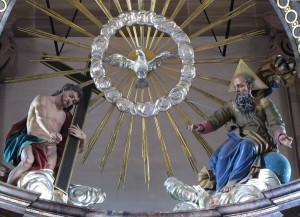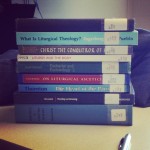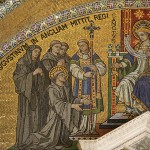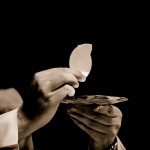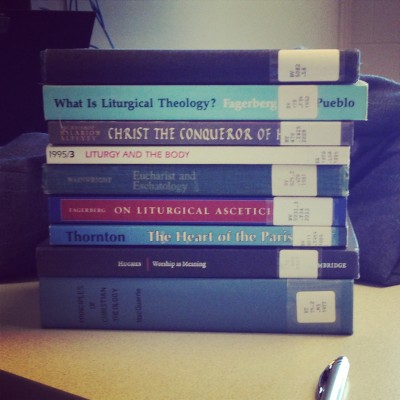If you’re new to my Sermon Notes, you can read about why I prepare them here. They aren’t just for preachers, they’re for everyone! The goal of these notes is to help all of Christ’s Body (at least those who read them) come to Sunday worship prepared for and by God’s Word.
Thesis
Rebecca and I served an Anglican church plant in Southern California led by her parents before moving here to Kansas. The rector (and my father-in-law) Ellis used to joke that Trinity Sunday was always a good opportunity to let a seminarian preach! You may be that seminarian or you may not have a seminarian to pick on, but either way this can be a tough yet fun Sunday for preaching.
This week will be a little different. In addition to these notes I’ll be posting my own Proper Preface for Trinity Sunday and a sermon that I wrote for this Sunday as part of my ordination exam several years ago. Trinity Sunday comes around every year on the Sunday after Pentecost so make sure you save as many links and resources as possible for years to come.
The basic theme that I want to weave throughout these lessons is that prayer and worship is “to the Father, through the Son and by the Spirit.” The Trinity is present and active in our worship as both object and subject, catalyst and recipient, inhabitant and sustainer. Over the last 90 days (since Epiphany) we have celebrated the manifestation of God in Christ, Holy Week, Easter, Ascension and Pentecost. The foundation has been laid for us to move into an extended season in which we celebrate and praise “Jesus Christ our Lord, who lives and reigns with you (the Father) and the Holy Spirit, one God, for ever and ever. Amen.”
This is not the appropriate time to try and delve into the mystery of the Trinity with any sort of mathematical gymnastics or philosophical ponderings. The purpose here is not to prove the Trinity but rather to worship the Trinity. Let that be your charge and call in your sermons (or worship if you aren’t preaching).
Analysis
Collect
Almighty and everlasting God, you have given to us your servants grace, by the confession of a true faith, to acknowledge the glory of the eternal Trinity, and in the power of your divine Majesty to worship the Unity: Keep us steadfast in this faith and worship, and bring us at last to see you in your one and eternal glory, O Father; who with the Son and the Holy Spirit live and reign, one God, for ever and ever. Amen.
Grace. Faith and worship. Glory, majesty and unity. Trinity. Father, Son and Holy Spirit.
The opening Collect for Trinity Sunday is rich with robust, vibrant and dynamic theological statements about the triune God. The stage is set as it were for a majestic experience of worshipping the Trinity.
The first “point” made in the Collect is quite clear: “true faith” is acknowledging the Trinity. Actually, it’s more than that. It is acknowledging both the glory and eternity of the Trinity. The glory of the Trinity is that our God is one and reigns over all. The eternity is that the three persons of the Trinity have existed eternally and are not created beings.
We are then to worship the Trinity. Father, Son and Holy Spirit are one forever and ever and are worthy of our eternal praise. Acknowledging the Trinity’s existence is not enough—one does not simply “understand” or “assent” to the Trinity and then go on about one’s day. At least, one should not do that. The proper response to the triune God is simple: overflowing, self-giving, radical and reckless worship.
What makes all of this possible? Grace! It is by God’s grace that we are able to both understand and worship. Knowledge and worship are gifts from God—we do not “own” or “deserve” them, nor have we “earned” them. We are the grateful recipients of such gifs and from the overflow of our gratitude come our sacrifice of praise and thanksgiving.
Our prayer is that God would keep us steadfast in this and bring us to the last day. We need strength and nourishment along the way. Remember that these theological sentiments are being offered in the context of prayer and are therefore meant to guide our minds toward the Trinity and to prepare our hearts and minds for the lessons and sermon…pray this slowly and with authority! Let this truly be a time of heartfelt prayer rather than the few lines that need to be said so we can move on to the “meat” of the morning, i.e. the sermon. Prayer is what undergirds and overrides all that we “do” as the church when we gather together.
Old Testament – Isaiah 6:1-8
Isaiah’s vision of the throne room is our Old Testament lesson for the morning. It is Trinitarian in nature and it powerfully depicts both the majesty of God and the urgency of our call into the world.
The vision takes place in the year that King Uzziah (Azariah) died. Uzziah/Azariah had been king over Israel for 52 years and therefore the year of his death would have been quite noteworthy. Biblical scholars and historians place his death between 742 and 735 BC. It is against this backdrop that Isaiah sees the real LORD and King of Israel (and all creation) seated on his throne. Talk about juxtaposition!
Uzziah had kept the Assyrians at bay and had brought stability to Israel at a time when she desperately needed it.
And now he was gone.
And there was a leadership void.
And Israel was in a time of transition.
And Israel didn’t always do transition well.
The opening 3 verses of Isaiah 6 can be seen as a reassurance and comfort to Israel that though her king was dead her true King was still reigning and ruling over the whole cosmos. The term rendered “LORD” in English means “Sovereign”; the sovereign one of Israel is the one who “watches over” her and “neither sleeps nor slumbers” (Psalm 121:4). I.e. YHWH is in control, do not be afraid!
Isaiah finds YHWH seated on the throne in the temple and he sees YHWH in all of his glory. John Goldingay writes, “Isaiah sees Yahweh awesome in royal honor and splendor (see, e.g. Ps. 97). That glory is the outward manifestation of Yahweh’s being holy (see on 1:4).”[1] Isaiah witnesses the act of worship in process as those serving and attending YHWH are signing to him:
“Holy, holy, holy is the LORD of hosts;
the whole earth is full of his glory.”
Before we allow the words of this song to automatically take us to the Eucharist and the throne room of Revelation—and we will go there!—we must first pause to reflect that elsewhere in Isaiah we find a twice-repeated anthem of “Holy.” However, this is the only time in Isaiah’s long scroll that we encounter the thrice-holy hymn. Such is the greatness of YHWH’s glory and holiness! The earth cannot contain him, nor can the throne or the use of human language—he is that holy! He is awesome and awful in the traditional meanings of both words!
The vision then transitions from YHWH’s holiness to his purity and his charge to Isaiah. The utter and complete holiness and purity of God is in stark contrast to the polluted and sinful nature of humanity. Isaiah draws back from YHWH on account of both these realities. Isaiah links this dirtiness with the lips of the people of Israel (Judah) and can therefore not open his mouth until he is made clean through purification.
YHWH does indeed purify him. Goldingay again writes, “Merciful grace belongs as much to the essence of God’s holiness as justice and purity.”[2] Isaiah had already identified his lips as being the source of pollution (Israel’s lips as a whole) and it is then through his lips that he will boldly proclaim the greatness of the Holy One of Israel to a sinful nation in need of repentance. Isaiah is able to speak the line that throughout scripture is recorded as one of extreme worship, surrender and love, “Here am I; send me!” The response to the Holy One is worship and action, cleansing and proclamation, purification and repentance.
Canticle 13 – Benedictus es, Domine
I really like the use of the Benedictus here instead of Psalm 29. Psalm 29 is truly wonderful, but there is something about the succinct articulation of God’s holiness and our corporate worship of him in the Benedictus that merits its use on Trinity Sunday. Certainly it helps that the last verse contains a reference to the Trinity. I have copied it here below but you can find it online or on page 91 of your BCP (1979) if you have one.
Glory to you, Lord God of our fathers; *
you are worthy of praise; glory to you.
Glory to you for the radiance of your holy Name; *
we will praise you and highly exalt you for ever.
Glory to you in the splendor of your temple; *
on the throne of your majesty, glory to you.
Glory to you, seated between the Cherubim; *
we will praise you and highly exalt you for ever.
Glory to you, beholding the depths; *
in the high vault of heaven, glory to you.
Glory to you, Father, Son, and Holy Spirit; *
we will praise you and highly exalt you for ever.
The whole Canticle is teeming with references to God’s glory, the glory we give him, and the reason for which we give it all. You could move through the Canticle phrase by phrase to pick it apart and offer reflections upon each. The bottom line is that God is highly exalted and worship of our praise and we therefore give him glory and through our worship he is praise and highly exalted further.
Glory to him, for:
- He is God of our fathers
- His Name is radiant and holy
- His temple is splendid and His throne majestic
- He is seated between the Cherubim
- The depths and high vaults cannot contain Him
- He is Father, Son and Holy Spirit
I hope you are getting the picture thus far. After the passage from Isaiah and the Canticle—or even if you use the Psalm—God’s glory is proclaimed with rich imagery and great zeal. He is glorious. He is radiant. He is worthy of praise. He is sovereign.
Epistle – Romans 8:12-17
Leave it to the RCL to throw in a “difficult” passage during Trinity Sunday: as if preaching on the Trinity wasn’t tricky enough! I say this passage from Romans is difficult because the whole of Romans is tough if you have on the wrong lens. There are those who think Romans 9-11 are meaningless or irrelevant compared to Romans 1-8 and 12-16 which therefore colors their opinion of our passage. I am of the opinion, an opinion shared by N. T. Wright and others, that Romans 9-11 is the most central part of Paul’s argument and therefore our passage today is part of the build up to this climax. I apologize if I’ve just thrown you into the deep end of a theological and biblical argument with which you weren’t aware. Read Justification by N. T. Wright if you’d like to know more.
Either way, Romans 8:12-17 is part of a critical section in Paul’s epistle to the Romans as he talks about the nature and meaning of being God’s children. As Wright writes, “Once again it is important, reading a complex passage like this, not to get bogged down in detail but to keep in mind the overall direction and underlying argument.”[3] Paul is concluding an argument from 7:1-8:11 (and from chapters 5 and 6) with “So then.”
“We are debtors” is the way Paul opens this section. Wright reminds us, “Following a habit that the reader of Romans is by now used to, Paul never actually finishes the sentence he begins. ‘We are debtors,’ he beings to say—but breaks off to say what his readers are not indebted to, leaving them to work out from the way the argument proceeds who they are in fact indebted to.”[4]
The first move in Paul’s argument is to claim that we are not indebted to the flesh. This is not a rejection of the flesh in some dualistic fashion but rather a reminder that our current bodies are not all they can be or will be. It is a reminder that in New Creation (via resurrection) our bodies will be different. That is, our bodies are still subject to disease, destruction and death—how then could be we in bondage to our bodies?
This moves into an interesting argument about death through the flesh and life through the Spirit. To rely on our bodies, or to live only in the flesh, will undoubtedly result in death because that is our natural end. However, if we live by the Spirit and put to death the ways (sins) of the flesh then we will find true and everlasting life even after physical death. Wright comments that the translation as “deeds” of the body is wrong and should be “misdeeds” of the body because we are still called to action!
Paul transitions smoothly from v. 13 to 14 with the use of “for” (gar). He is continuing his thoughts on life by the Spirit. This move would also suggest that we are in fact indebted to the Spirit. If death is through the flesh and we are not indebted to the flesh, and life is through the Spirit then it would follow that we owe our debt to that same Spirit. We owe the debt because it is by the Spirit that we are adopted and made sons and daughters of God.
Such status change—becoming sons and daughters—is done through adoption rather than slavery. If we are in fact to imagine a courtroom scene, as the language of justification in Romans seems to suggest, then envision the scene of adoption court rather than criminal court. In adoption (or family) court we have pronounced over us by God-the-Judge a change in our status: we are now adopted (grafted) eternally into God’s family. Wright says, “…the Spirit, who now does for God’s people that which the tabernacling presence of God did in the wilderness, assuring them of divine adoption and leading them forward to their inheritance.” The Spirit seals and guides us.
We are then not to be afraid of our loving Father but to approach him as a child would—a full member of the family—and we can cry out “Abba Father” in the most intimate ways possible.
Paul has been working through the imagery of the Exodus throughout Romans 1-8 and continues in this section. The reference to “slavery” is not only suggesting slavery to sin and the flesh but also in a recapitulation of Israel’s slavery to and subsequent release from Egypt. God delivered his people out of bondage and then fashioned a people for himself—adopting them—on the slopes of Mt. Sinai. That which he did for Israel in a physical sense he now does for his people (the New Israel) in a real, spiritual and eternal sense.
We are made heirs with Christ. We share in his sufferings as his crucified people but we also share in his glory: the glory of his everlasting inheritance. To be God’s adopted family and chosen people is to join Christ at work in the world and to refuse to cease suffering alongside those in pain in need. We stand in solidarity with our brothers and sisters just as Christ our brother stood in solidarity with humanity and suffered.
Notice the Trinitarian shape of this passage: we are children of the Father through the work of the Son and made coheirs of the Son through the witness and work of the Spirit.
Gospel – John 3:1-17
Nicodemus features in our gospel lesson once more as we move back to John 3 and encounter Nic-at-Nite with Jesus. Nicodemus travels to see Jesus under the cover of night and darkness because he is a Pharisee and it would not be looked upon favorably if it got out that he had engaged this itinerant preacher who went against the customs, traditions and rules of the religious elite.
The whole dialogue between Jesus and Nicodemus is quite comical, but the point I want to tease out is the connection between John 3 and Romans 8 with reference to the Spirit and flesh. Nicodemus assumes that Jesus is suggesting a fleshly rebirth whereas Jesus is obviously talking about being born of the Spirit. Through the flesh comes death and through the Spirit there is life. Does this sound familiar yet?
Jesus makes abundantly clear that both he and the Spirit are from on high—from God. He also makes it clear that the Spirit cannot and will not be contained, just as the wind cannot be contained or controlled. It is quite fitting that the week after Pentecost we are still receiving theological instruction about the person and work of the Spirit!
The reference to Moses and the bronze snake is a favorite of mine. Just as the snake was lifted on high for all to see and be healed, so too shall Jesus be lifted on high that all might believe in him. God saved his people (yes, from snakes that he unleashed) through the bronze snake and he would again save his people from the darkness of sin, evil and death through the glorification of his son—even through death. But are we looking upon Jesus? Sure, the cross is empty now but God is glorified in Christ crucified and Christ is “enthroned upon the Cross.” There is good reason to keep Jesus upon our crucifixes—even if it is the Triumphant Lord—as a reminder that there would be no empty tomb without an occupied cross.
The Spirit was not an uncommon topic for Israel which is why Nicodemus’ answer is all the more surprising as a teaching of the law. We just read the prophesy of Joel and the account of Ezekiel and the Dry Bones for Pentecost Sunday! There was hope in the Spirit (read ruah) that would be given to God’s people, by God, for God’s kingdom.
The passage ends on a note of hope: God sends his son out of love not to judge or condemn but to save. The work of the Trinity has always been for the flourishing and goodness of creation. God is not going to destroy this world but to redeem, restore and renew his creation through the Incarnation, Crucifixion, Resurrection, Ascension and Second Coming of Jesus—and we are invited and called to join in that work!
Liturgical Considerations
I have already made one liturgical suggestion in selecting Canticle 13 over Psalm 29. I also believe that you should select music that really gets at the heart of God’s triune holiness. Perhaps the beautiful hymn, “Holy, Holy, Holy” would be appropriate! Tell your music minister (if you aren’t the one making the selection) to pick songs that reflect both the utter holiness of God and that capture his being Father, Son and Holy Spirit.
Liturgical worship is Trinitarian worship. It is to the Father, through the Son and by the Spirit. Our collects and Eucharistic prayers reflect that fact. Rather than adding new prayers, I’d like to return to our conversation from above and join Isaiah’s vision with that of the Eucharist:
Our minds can now wander to the throne room scene in Revelation when those attending God are found singing (day and night, without ceasing): “Holy, holy, holy, the Lord God the Almighty, who was and is and is to come,” (Revelation 4:8). These songs (Isaiah and Revelation) are echoed in the Sanctus of the Eucharist as we “join[ing] our voices with angels, and archangels, and all the company of heaven who forever sing this hymn to proclaim the glory of your Name:
Holy, Holy, Holy Lord, God of power and might,
heaven and earth are full of your glory.
Hosanna in the highest.
Blessed is he who comes in the name of the Lord.
Hosanna in the highest.”
With and by the Sursum Corda (“Lift up your hearts” or more literally “Up, hearts”) we believe that our Eucharistic prayer takes place in the throne room of Almighty God and we truly join our voices with the cosmic and eternal song. Perhaps you can set this song to music if you don’t already. Either way, sung or spoken, make a joyful noise to the Lord and draw the attention of your people to the Sanctus so they can proclaim this great truth boldly.
Synthesis
The Collect really does provide the foundation for the entire Lectionary this week: the glory of the eternal Trinity and the power of the divine Majesty. May we acknowledge and worship the Trinity! Each lesson paints a beautiful picture of the utter holiness and love of the triune God. Isaiah depicts YHWH as the Holy One of Israel who purifies and sanctifies his people. The Canticle calls us to give God glory for all He has done. Paul reminds us in Romans that we are made children of the Father through the work of the Son and made heirs of the Son through the work of the Spirit. John’s gospel weaves together the need to be born of the Spirit and God’s great love for the world in the giving of his only son. This is our God!
But have we acknowledged Him?
Are we worshipping Him?
Are we praying that we would be kept steadfast and brought to the last day?
Is our response to God’s holiness, “Here am I, send me! Or do we shy away in fear?
Do we have in us the spirit of slavery or adoption?
Have we given ourselves completely to the work of the Trinity in this world?
[1] Goldingay, Isaiah, “Understanding the Bible Commentary Series,” 59.
[2] Ibid, 59.
[3] Wright, Romans, New Interpreter’s Bible Commentary, 592.
[4] Ibid, 592.

